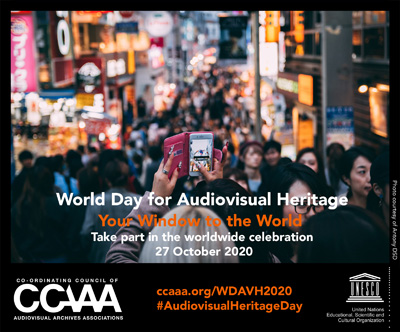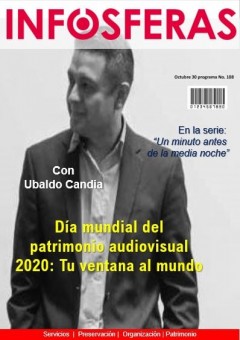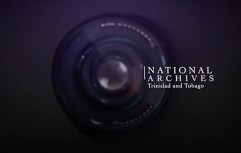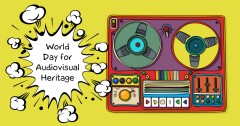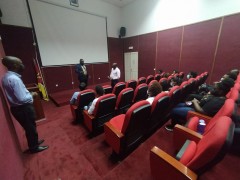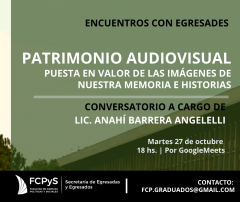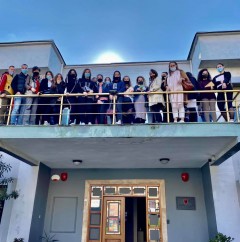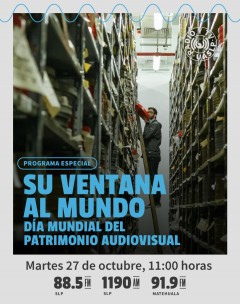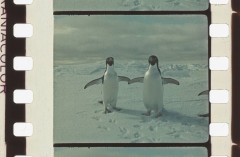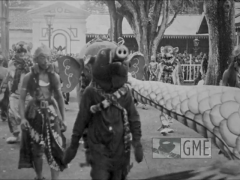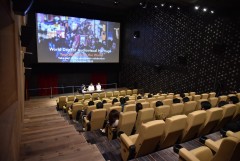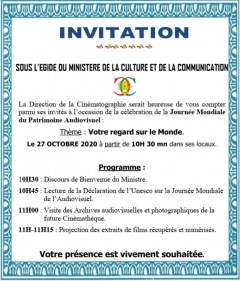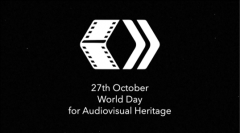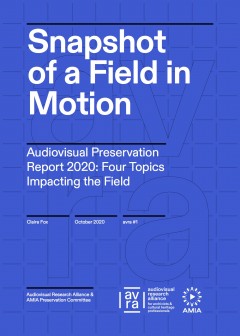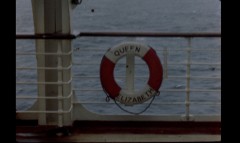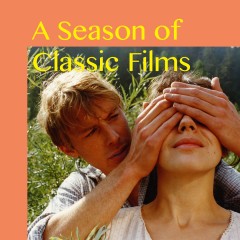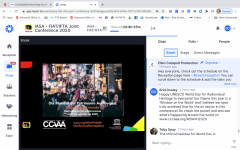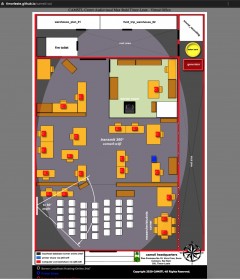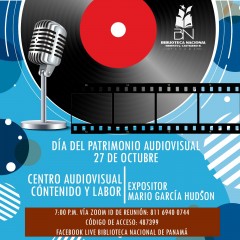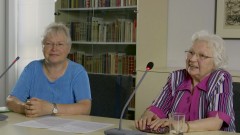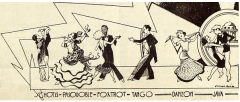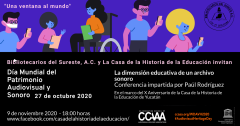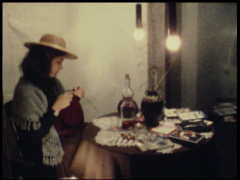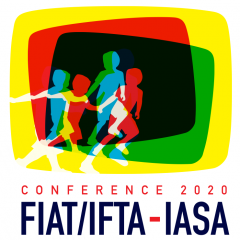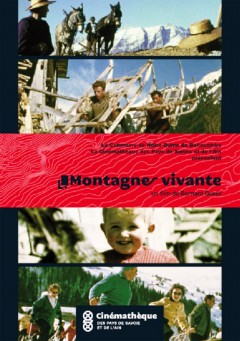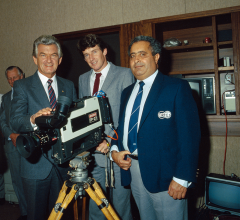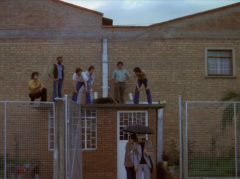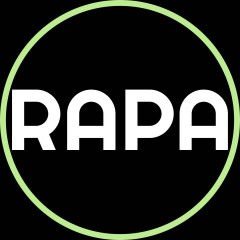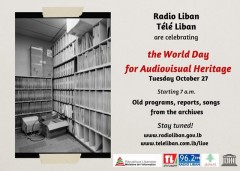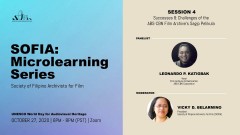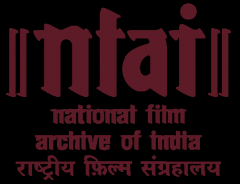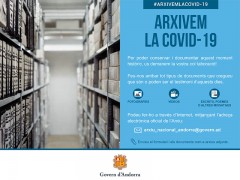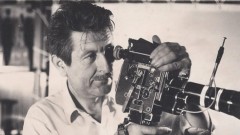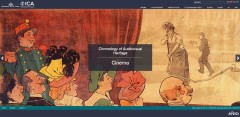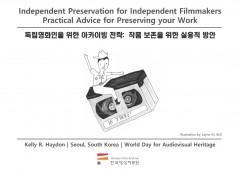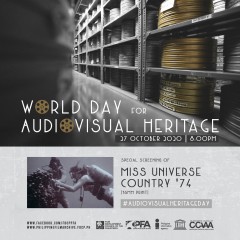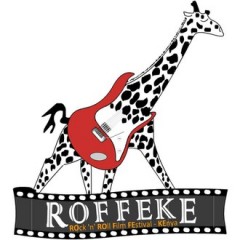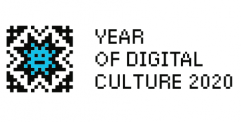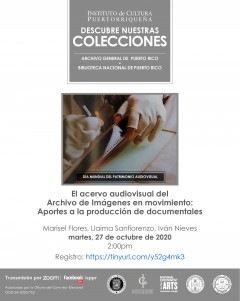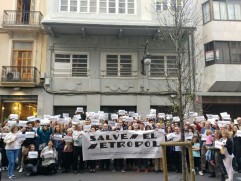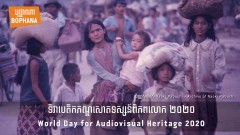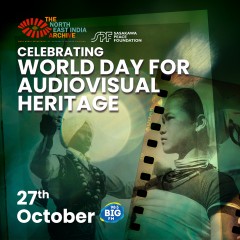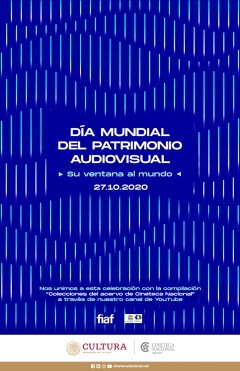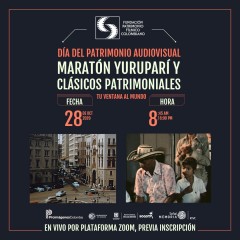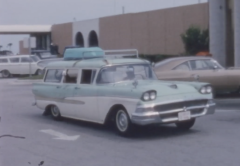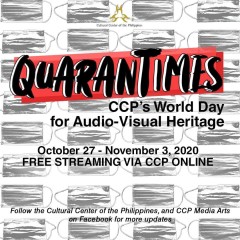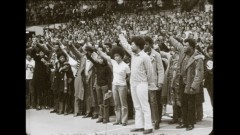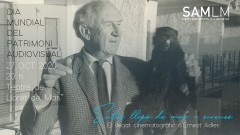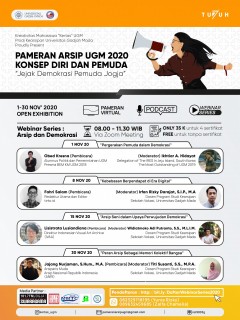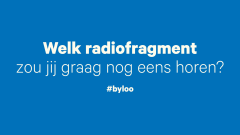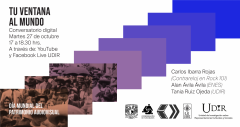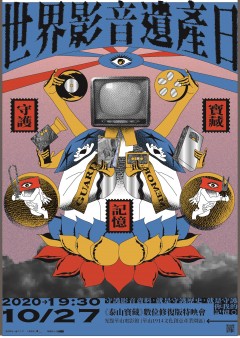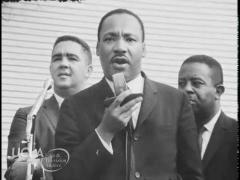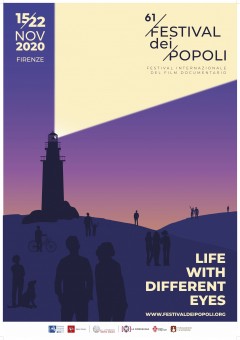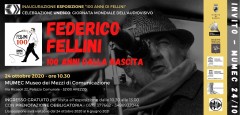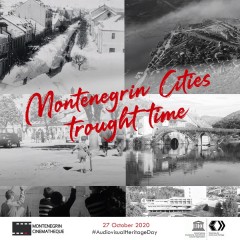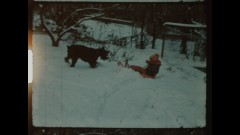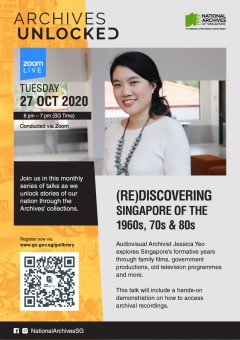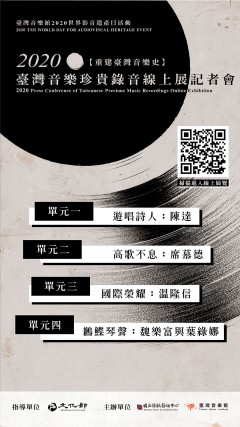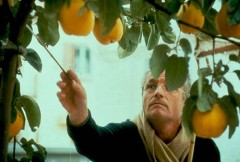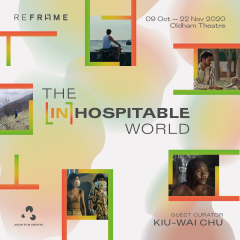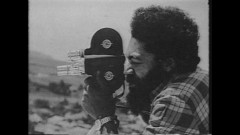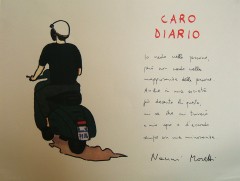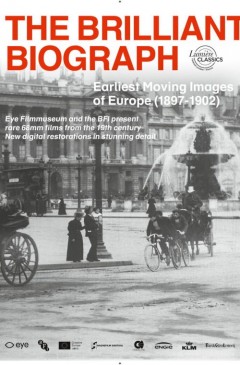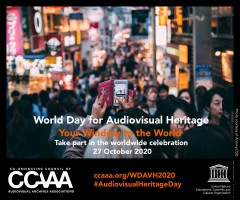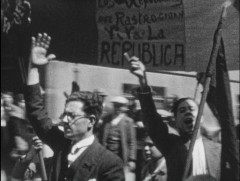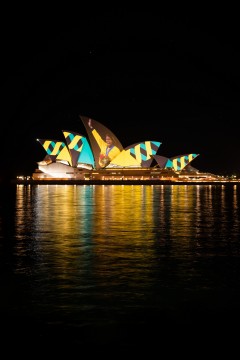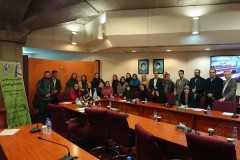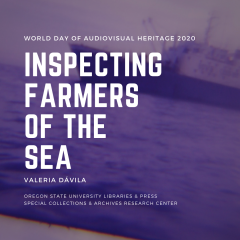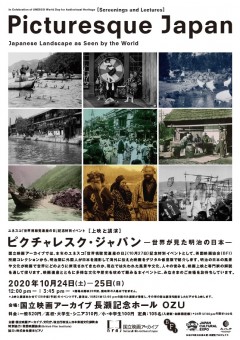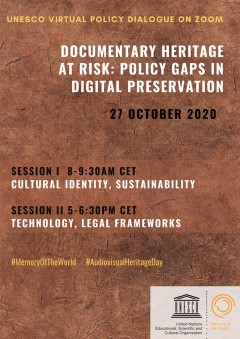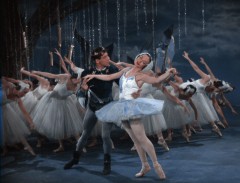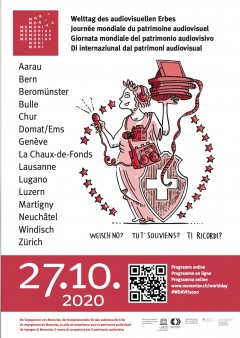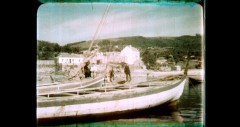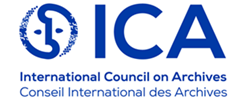2020 World Day for Audiovisual Heritage
This year's theme: "Your Window to the World"
Add your event at the end of this page!
The World Day for Audiovisual Heritage - 27 October - is key initiative for both UNESCO and the Coordinating Council of Audiovisual Archives Associations (CCAAA) to honor audiovisual preservation professionals and institutions that safeguard our heritage for future generations. Around the world audiovisual archives join together annually on this day to celebrate their work with events that not only highlight the vulnerability of these valuable materials, but also to celebrate the often, unheralded work of the institutions that provide protection and preservation, ensuring their availability in the future.
This year the theme of the World Day for Audiovisual Heritage is "Your Window to the World".
2020 WORLD DAY FOR AUDIOVISUAL HERITAGE: CCAAA DECLARATION
2020 has been an exceptionally challenging year so far, with the COVID-19 pandemic bringing the world to its knees. Although we cannot yet fully grasp the economic, social, and cultural impact this major crisis will have on our societies, it has already exacerbated existing humanitarian and political crises in many parts of the world; it has brought mass unemployment, further exposed inequities within our communities, and created new epicenters of hunger. During this time of social distancing and social unrest, audiovisual materials in the form of sound recordings, film, and video have provided crucial documentary evidence of both atrocities and triumphs of the human condition.
The CCAAA, along with other documentary heritage partners, co-signed UNESCO’s statement “Turning the threat of COVID-19 into an opportunity for greater support to documentary heritage” in order to stress the importance of recorded materials and promote the preservation and accessibility of audiovisual content. Audiovisual materials as documentary heritage objects provide a window to the world as we observe events we cannot attend, we hear voices from the past who can no longer speak, and we craft stories that inform and entertain. Audiovisual content plays an increasingly vital role in our lives as we seek to understand the world and engage with our fellow beings.
It is true that audiovisual materials are not inert and the archives that preserve them are not apolitical. While audiovisual recordings provide documentary evidence, they can also be highly mediated to tell a story from a specific perspective. At worst, they can be used to tell a false narrative. At best, they can be used to tell stories that would otherwise be silent. They can tell your story, your truth, your existence.
Join us on 27 October 2020 for World Day for Audiovisual Heritage by posting your events to this page. Promote justice, equity, and peace through audiovisual recordings. Celebrate the triumphs in your community and entertain us with your story. Show us your window to the world.
This Declaration is available as a PDF file in English, French, and Spanish.
Download and share the official poster in ENGLISH, FRENCH, and SPANISH.
The nine associations forming the CCAAA (AMIA, ARSC, FIAF, FIAT-IFTA, FOCAL International, IASA, ICA, SEAPAVAA, IFLA) strongly encourage all their members (and any other institutions) not only to join in the global celebrations of the 2020 World Day on and around 27 October, but also to share the information about their particular events, by filling the quick-and-easy form at the bottom of this page. Your descriptive text can be in the language of your choice (or even better... in several languages), but we ask you to limit it to 500 words max. You can also attach one image per event. Please fill in and submit one form per event. Your contributions will be automatically added to the list of Word day events on this page (the latest added event will appear at the top of the list).
Happy 2020 World Day for Audiovisual Heritage !
2020 World Day for Audiovisual Heritage
This year's theme: "Your Window to the World"
Add your event at the end of this page!
The World Day for Audiovisual Heritage - 27 October - is key initiative for both UNESCO and the Coordinating Council of Audiovisual Archives Associations (CCAAA) to honor audiovisual preservation professionals and institutions that safeguard our heritage for future generations. Around the world audiovisual archives join together annually on this day to celebrate their work with events that not only highlight the vulnerability of these valuable materials, but also to celebrate the often, unheralded work of the institutions that provide protection and preservation, ensuring their availability in the future.
This year the theme of the World Day for Audiovisual Heritage is "Your Window to the World".
2020 WORLD DAY FOR AUDIOVISUAL HERITAGE: CCAAA DECLARATION
2020 has been an exceptionally challenging year so far, with the COVID-19 pandemic bringing the world to its knees. Although we cannot yet fully grasp the economic, social, and cultural impact this major crisis will have on our societies, it has already exacerbated existing humanitarian and political crises in many parts of the world; it has brought mass unemployment, further exposed inequities within our communities, and created new epicenters of hunger. During this time of social distancing and social unrest, audiovisual materials in the form of sound recordings, film, and video have provided crucial documentary evidence of both atrocities and triumphs of the human condition.
The CCAAA, along with other documentary heritage partners, co-signed UNESCO’s statement “Turning the threat of COVID-19 into an opportunity for greater support to documentary heritage” in order to stress the importance of recorded materials and promote the preservation and accessibility of audiovisual content. Audiovisual materials as documentary heritage objects provide a window to the world as we observe events we cannot attend, we hear voices from the past who can no longer speak, and we craft stories that inform and entertain. Audiovisual content plays an increasingly vital role in our lives as we seek to understand the world and engage with our fellow beings.
It is true that audiovisual materials are not inert and the archives that preserve them are not apolitical. While audiovisual recordings provide documentary evidence, they can also be highly mediated to tell a story from a specific perspective. At worst, they can be used to tell a false narrative. At best, they can be used to tell stories that would otherwise be silent. They can tell your story, your truth, your existence.
Join us on 27 October 2020 for World Day for Audiovisual Heritage by posting your events to this page. Promote justice, equity, and peace through audiovisual recordings. Celebrate the triumphs in your community and entertain us with your story. Show us your window to the world.
This Declaration is available as a PDF file in English, French, and Spanish.
Download and share the official poster in ENGLISH, FRENCH, and SPANISH.
The nine associations forming the CCAAA (AMIA, ARSC, FIAF, FIAT-IFTA, FOCAL International, IASA, ICA, SEAPAVAA, IFLA) strongly encourage all their members (and any other institutions) not only to join in the global celebrations of the 2020 World Day on and around 27 October, but also to share the information about their particular events, by filling the quick-and-easy form at the bottom of this page. Your descriptive text can be in the language of your choice (or even better... in several languages), but we ask you to limit it to 500 words max. You can also attach one image per event. Please fill in and submit one form per event. Your contributions will be automatically added to the list of Word day events on this page (the latest added event will appear at the top of the list).
Happy 2020 World Day for Audiovisual Heritage !
Click HERE to open a new window with a printable version of the list below.
INFOSFERAS:
El primer canal GLAM (galleries, libraries, archives, and museums) en idioma español, donde su creador Francisco Esquivel ejerce eficientemente ciudadanía digital y conciencia cultural social, al desarrollar esta iniciativa educativa. La cuál, fue incorporada en 2017 en el directorio ECOTIC, administrado por la Secretaría de Educación Pública y la Universidad Pedagógica Nacional.
En su quinta temporada ha tenido un alcance de 4 millones de personas; INFOSFERAS permite documentar y socializar la actividad del universo de los Archivos, Bibliotecas, Galerías y Museos. Apoyando a instituciones educativas y asociaciones en sus producciones de video digital, atendiendo siempre los objetivos de la Agenda 2030 de la UNESCO.
Los contenidos educativos son:
1.- Responsabilidad social, difusión a campañas, procuración de fondos y proyectos de innovación / ODS 10 Reducción de las desigualdades
2.- Reseñas de eventos académicos y de tecnología relacionada con Archivos, Bibliotecas, Museos y Galerías / ODS 04 Educación de calidad
3.- Tour por recintos para conocer: Infraestructura, Servicios, Colecciones / ODS 04 Educación de calidad
4.- Charlas con personas relacionadas con el mundo de los Archivos, Bibliotecas, Museos y Galerías / ODS 03 Salud y bienestar – ODS 12 Producción y consumo responsables
En la sección: “Un minuto antes de la medianoche”, que se transmite los viernes a las 23:59 hrs., se abordan temas de interés para el universo GLAM en un tono coloquial y divertido. En la emisión del 30 de Octubre, se abordará el tema del Día Mundial del Patrimonio Audiovisual, disfrutaremos una charla con el Mtro. Ubaldo Candia Reyna, documentalista audiovisual de consolidada trayectoria y visión de vanguardia.
Revisaremos los orígenes de esta conmemoración, escucharemos testimonios de algunos de los documentalistas pilares de esta disciplina en el mundo, así como algunos documentos relevantes y anécdotas del quehacer cotidiano en la disciplina.
Audiovisual archives bring to life the essence of our Caribbean past, including aspects of the social, cultural and physical environment that written archival records have not captured. At the National Archives of Trinidad and Tobago, we believe that it is important to preserve audiovisual archives as a valuable part of our collective memory. This is particularly relevant for post-colonial nations like Trinidad and Tobago that have strong oral traditions.
To celebrate World Audiovisual Heritage Day 2020, we have created a three-part series featuring the work of the National Archives’ Audiovisual Digitization Project, which continues to digitize the Government of Trinidad and Tobago’s historical analogue videos for long-term preservation and access. One of the videos provides a glimpse into life in Trinidad and Tobago in the 1980s. We invite you to view this video by following the link below: https://www.facebook.com/watch/?v=759576904590426.
Also in this series, we feature the archives of Banyan Ltd.–an independent television production house that has operated in Trinidad and Tobago since 1974. Banyan produced the Anglophone Caribbean’s first soap opera and pioneered innovative local TV programming. It launched the first free-to-air community television in the region in 2003, with 100% local and regional content. Over the years, Banyan Ltd. has amassed an extensive video collection that provides a unique window into our culture and oral history. Through determined efforts, the entire collection of analogue video programmes of the 1970s, 1980s and 1990s, such as the popular Gayelle and Caribbean Eye series, has been digitized. The DVD collection of the archives is available for viewing at the National Archives.
For a preview of the Banyan Archives, please follow this link: https://vimeo.com/133565760. For further information and to view the Banyan Archives’ online catalogue, please visit this site: http://www.pancaribbean.com/banyan/archivedatabase.htm.
To view more content from this series, please check us out on our Instagram page (@nationalarchivestt) and/or on our Facebook page (“National Archives of Trinidad and Tobago).
On the ocasion of the World Day for Audiovisual Heritage the Ethnomusicology department of the Faculty of Music in Belgrade presents the Phonoarchive, the independent unit within its assembly. This year we mark the 30th anniversary of the founding of the Phonoarchive in 1990. by ethnomusicologist, Prof. Dr. Dragoslav Devic whose reel-tape collection with recordings of musical tradition of differnt areas of Serba and former Yugoslavia is the core of the Phonoarchive content.
The primary goals of our activities within Phonoarchive is preservation of the original sound and video recordings and photographs of traditional music and dance of Serbia through digitization, cataloging, professional processing and permanent storage of recordings, both on original sound carriers (reel-tapes, audio tapes, video tapes ...) and in the form of digital copies; their systematic publication; networking with other insitutions of similar profiles in Serbia and in the region.
Collection of recordings of the rich music and dance tradition of Serbia and other, neighboring countries is been constantly enlarged by adding the new recordings of colleagues, ethnomusicologists and ethnocoreologists, professors and students, in line with their profesional filedwork activities.
The importance of our Phonoarchive for the preservation National cultural heritage is huge. On the World Day for Audiovisual Heritage 2020, and this year’s slogane Your Window to the World by connecting past and future, we are giving our contribution in raising awareness of the importance of preservation of the audiovisual heritage as the testimony of the human lives.
Author of the video: MA Ana Petrović, teaching assistant at the Ethnomusicology department
Em homenagem ao Dia Mundial do Patrimônio Audiovisual, o Arquivo Nacional promove o evento "'Alvorada lá no morro': o audiovisual e a cidade", no dia 27 de outubro de 2020, às 14h, através de sua página no Facebook. O evento ficará gravado e disponível no canal do Arquivo Nacional no Youtube.
O tema escolhido este ano pelo CCAAA foi “Your Window to the World" (Sua Janela para o Mundo), colocando em destaque o papel dos registros audiovisuais na vida das sociedades, sobretudo neste contexto de pandemia.
Como diz a declaração do CCAAA: “Os materiais audiovisuais como objetos de patrimônio documental fornecem uma janela para o mundo, pois observamos eventos aos quais não podemos assistir, ouvimos vozes do passado que não podem mais falar e criamos histórias que informam e divertem. O conteúdo audiovisual desempenha um papel cada vez mais vital em nossas vidas, à medida que buscamos compreender o mundo e nos envolver com nossos semelhantes”.
Assim, olhando o mundo através de nossas janelas e através dos registros audiovisuais, esta edição do evento no Arquivo Nacional abordará a cidade, suas transformações e a questão da moradia, com exibição de filmes do acervo do AN e dos cineastas Ana Maria Magalhães e Sérgio Péo, seguida de mesa de debates.
Programação:
14h - Exibição de filmes:
Reidy, a construção da Utopia - trailer, de Ana Maria Magalhães (2009, 2 min, cor)
Mangueira do Amanhã - trecho, de Ana Maria Magalhães (1992, 8 min, cor)
Rocinha Brasil 77, de Sergio Péo (1977, 18 min, cor)
Filmes do acervo do AN (6 min)
14h40 - Mesa de debates com:
Ana Maria Magalhães, cineasta;
Rachel Viana, pesquisadora de pós doutorado da Casa de Oswaldo Cruz / Fiocruz;
Sérgio Péo, cineasta.
Mediação: Ana Carolina Reyes
On 27 October, on the occasion of the World Day for Audiovisual Heritage, the Instituto Nacional das Indústrias Culturais e Criativas invited 12 students from the Universidade Politecnica, 8 students and a professor from the Universidade Edurado Mondlane, one professor from the Universidade Pedagogica and 2 researchers to participate in an activity related to the worldwide event.
Last evening, China Film Archive's 4K digitally restored version of Linjia Puzi (aka The Lin Family Shop, 1959) had its Beijing premiere in the art theater to celebrate the World Day for Audio Visual Heritage 2020. With an excellent guiding introduction about this film and the restoring background, we spent a wonderful time with the audience to enjoy the new look of the classic film.
Linjia Puzi undoubtedly leads the most representative films from the period of "17 years" of Chinese Film history. Directed by Shui Hua, adapted by Xia Yan from Mao Dun's literature, it focuses on the destiny of a small shop in a river town of Zhe Jiang in 1931 when the war just began. The story of the shop holding on to its business mirrors the anxiety and dilemma of the whole society at that time and the camera vividly captured people's struggling to survive from the harsh and turbulent social environment during the wartime. Not only it stands out for the exquisite drama but also values as a unique resource of historical research.
The well-known film star Ms. Yulan also played a role in Linjia Puzi, who just passed away in June 27, 2020 in Beijing at the age of 99.
El conversatorio repasará la producción audiovisual en su dimensión patrimonial tanto como huella y memoria histórica, como también fuente de información para el análisis de múltiples abordajes interdisciplinares.
Se hará incapié en el estado de alarma en el que se encuentra el Patrimonio Audiovisual y los trabajos de preservación que se estan realizando en la provincia de Mendoza Argentina.
This year the celebration of World Day for Audiovisual Heritage 2020 in Tirana, Albania was marked with the initiation of the Albanian National Film Archive (AQSHF) collaboration with the distinguished POLIS University!!! During this academic year, the master program students of the POLIS University, which study in the various disciplines of Art & Design, Architecture & Engineering, Urban Planning and Environmental Studies, will design various proposals and projects on how we can be better equipped for the challenges that the Albanian National Film Archive (AQSHF) faces as the sole custodian archival institution of the Albanian film heritage! What a window into the future became their first visit to the AQSHF facility. The inspiring discussions with the students, their professors and the archive's specialists, that followed our AQSHF's 35mm film and film related presentations, give us hope to a brighter tomorrow! At the end of this collaboration, the students of POLIS University will present their concept ideas and project proposals on how the Albanian National Film Archive indoor and outdoor spaces can be better organised and function according to the contemporary needs and standards that archival institutions must meet in the times we live in.
La Dirección de Radio y Televisión de la Universidad Autónoma de San Luis Potosí, se une a las celebraciones por el Día Mundial del Patrimonio Audiovisual con un programa especial multiplataforma para la radio y redes sociales. En este programa se creó un diálogo con especialistas para conversar sobre la importancia de la salvaguarda, preservación y acceso de películas, audios, videos, programas de radio y televisión, del cine, en otros documentos que forman parte de nuestra memoria e identidad.
Invitados:
Virginia Bazán Gil (Federación Internacional de Archivos de Televisión FIAT/IFTA; Radio y Televisión Española)
Fernando Osorio Alarcón (Memoria del mundo, UNESCO México; Fotobservatorio del patrimonio fotográfico mexicano).
Conduce: Ubaldo Candia Reyna (Centro de Documentación de Radio y Televisión, UASLP).
Desde 2018 el Instituto Antártico Argentino y el Museo del Cine de Buenos Aires llevan adelante un proyecto cuyo objetivo es el rescate, preservación y divulgación de los materiales audiovisuales filmados en la Antártida Argentina a lo largo del Siglo XX. El Museo se suma a la celebración del Dia Mundial del Patrimonio Audiovisual presentando una serie de materiales producto de esta colaboración junto a un dialogo con archivistas de nuestra cineteca donde describen los criterios y desafíos de su trabajo.
Gartenberg Media Enterprises presents a rare clip that Tassilo Adam filmed with the cooperation of the Royal authorities, who staged processions, and gatherings, and rituals for his camera. A number of these included representation of animals through dance. As the official ethnographer for the Dutch government of the East Indies, as well as a professional photographer, his moving image footage shows a considerably more sophisticated vision of the Dutch East Indies in the 1920s than other films of the period. Although transferred digitally, this material retains the lustrous sheen of the nitrate on which it was originally filmed.
In 2018, the National Film and Sound Archive of Australia (https://www.nfsa.gov.au/latest/nfsa-acquisition-highlights-2018) acquired this collection of 31 reels of original nitrate from Gartenberg Media Enterprises. GME unearthed this collection in a storage warehouse, and then catalogued and researched the history and provenance of this rare footage. We then identified the NFSA as the long term archival repository for this unique and valuable moving image collection that represents the inflection point of Indigenous peoples with Colonial culture.
The Thai Film Archive and alliances celebrated World Day for Audio Visual Heritage 2020 with the panel discussion on the Challenges of Archives in the World that will never be the same.
The event began with the presentation of two archival footage about two important political protests in the past. They were good samples of traditional audiovisual heritage. This led to the question; how the rapidly changing digital technology affects archival tasks, which were mainly discussed in the panel discussion.
The panelists were Assistant Professor Maytawee Holasut from Faculty of Liberal Art Thammasat University, Sittisak Rungcharoensuksri a digital archivist from Princess Maha Chakri Sirindhorn Anthropology Centre (Public Organization), and Thanachai Voraarj, head content creator of Echo, the online media company.
The discussion covered important issues such as the impact of digital technology on archives, the trend of the social media and web archives, the problem of preserving digital-born data, and the redefinition of archives in the digital age.
The Direction of the cinematography of Sénégal has celebrated the world audiovisual heritage day at its headquarter. Films restored and digitalized . Directors of the National Archives, Director Archives of the national télévision archives and several filmakers attended this event.
Open discussions were done about how to safeguard the audiovisual heritage archives .
Gosfilmofond. The inception. Chapaev
October 27 is The World Day for Audiovisual Heritage.How did the main Russian film archive begin? Yevgeny Margolit, a film historian, talks about the first big film which became the starting point for founding Gosfilmofond.
Госфильмофонд. Начало. Чапаев
27 октября мир отмечает День аудиовизуального наследия (The World Day for Audiovisual Heritage). С чего начинался главный российский киноархив? О первом большом фильме, который стал отправной точкой для создания Госфильмофонда, рассказывает историк кино Евгений Марголит.
On the occasion of World Day for AV Heritage, the Audiovisual Research Alliance for Archivists and Cultural Heritage Professionals in collaboration with the Association of Moving Image Archivists (AMIA) Preservation Committee is pleased to release Snapshot of a Field in Motion. Audiovisual Preservation Report 2020: Four Topics Impacting the Field written by independent researcher Claire Fox.
Much like the name of the report suggests, Snapshot looks into the sound and moving image archival and heritage landscape, exploring a number of shifting and emerging topics impacting the field in 2020. These topics are:
1. Providing and Preserving Captions for Digitized and Born-Digital Audiovisual Content
2. Testing and Implementing RAWcooked on DPX Film Scans
3. Identifying and Managing Born-Digital Video Collections
4. Knowledge Sharing as a Preservation Tool.
In addition to individual research, Snapshot draws upon conversations with, and collective feedback from, moving image and media archivists and preservationists from around the globe.
The Creative Commons licensed report can be found at www.beeldengeluid.nl/avresearchalliance or downloaded directly as PDF.
To join the conversation about this research, you’re welcome to follow and comment on the report on Medium.
To learn more about the AVRA and how it's working to fully develop the working methods of this new initiative over the coming months, please visit, www.beeldengeluid.nl/avresearchalliance.
Window on the world: World travel through the eyes of American home movies
A compilation of home movies that look at the travels throughout the world of American amateur filmmakers following these films as they cover leaving the states and heading to the Caribbeann, Europe, Far East, and back to the west coast of America. These films are from the 1920s to the 1970s and are taken from many different family collections to show a variety of films and filmmaking techniques. This compilation is made for the celebration of the 2020 World Day for Audiovisual Heritage. These films can be found at our Digital Collections website: https://digital.library.sc.edu/departments/mirc/
On the occasion of the World Day for Audiovisual Heritage, the Association des Cinémathèques Européennes (ACE), regional branch of FIAF, has published a new curated catalogue of European classic films.
The catalogue - put together in a joint collaboration by 22 European film archives - gathers over 50 short and long-feature films, showcasing distinguished titles and less known treasures. It provides a colourful palette of European cinema history aiming to be inspirational for film festival programmers around the world and cinemagoers.
This publication is part of the initiative ‘A Season of Classic Films’, running now its second edition and consisting of a series of free screenings planned between December 2020 and June 2021 across Europe to raise awareness of the work of European national and regional film archives, especially among a younger audience.
Considering that the COVID-19 pandemic means the events will be subject to certain limitations, we are pleased that several institutions also plan streaming events to enable greater access.
The initiative is supported financially by the European Commission. To download the publication and read more about the upcoming screenings, please visit the ACE website.
https://ace-film.eu/a-season-of-classic-films-programme-catalogue/
On the occassion of World Day FIAT/IFTA and IASA are jointly hosting our annual world conference online together from mission control n the heart of Dublin City, Ireland, hosted by RTÉ, the Irish Public Service Media Organisation along with our colleagues from BBC Northern Ireland .
We are celebrating this World Day together with in the region of a 1000 delegates from archives in all parts of the world joining us live online simultaneously. We have c100 individual sessions, 219 contributors and speakers from 70 countries ,all part of our global audio-visual archive network and community - truly a window on the world of the audiovisual archives sector.
We send greetings to all our colleagues and friends in CCAAA on this day wherever they are meeting or celebrating virtually or ortherwise, and particularly our UNESCO colleauges and representatives of the CCAAA who are meeting today also in an online dialogue on Preserving Documentary Heritage at Risk. We wish you a a fruitful and successful engagement.
Bríd Dooley, President of FIAT/FITA
Toby Seay President of IASA
front office online: http://camstl.uc.pt
back office localhost online: http://192.168.88.201
Additional Information
The importance of The Archive derives from the crucial role that audiovisual material played in the East Timorese struggle for self-determination and human rights. That struggle was captured in the faces and the voices of this very dedicated, resilient and persistent people by International film-maker Max Stahl on over 6000 hours of film and audio recording.
https://www.facebook.com/audiovisualarchivetimorleste/about
Para conmemorar el Día Mundial del Patrimonio Audiovisual, la Biblioteca Nacional de Panamá "Ernesto J. Castillero", presenta la conferencia “Centro Audiovidual, contenido y labor“, a cargo de Mario García Hudson, director del Centro Audiovisual, quien expondrá la importancia de los recursos sonoros y de la imagen en movimiento para la construcción de la memoria de un país.
En vivo por la cuenta de Facebook "binalpanama" a las 7:00 p.m, hora de Panamá.
The Saxon State and University Library (SLUB) in Dresden, Germany, had digitized 33 private films by a Saxon State Orchestra member and made them available in its media library. On the occasion of today's "World Audiovisual Heritage Day", a detailed interview with family members is published online, which provides information on the background of Alfred Schindler's passion for film.
_____________________________________________________________
What an exciting topic that would have been for Alfred Schindler: The Sächsische Staatskapelle playing in the Chinese city of Qīngdǎo – in the former German colonial town where German settlers founded the "Germania" Brewery in 1903, the successor of which is still brewing the popular Chinese beer "Tsingtao" and exporting it to more than a hundred countries... Alfred Schindler, a former solo violist of the orchestra, made short films on the many concert tours, about the country and its people. Schindler filmed cars, consumer products and street scenes in Venice, Granada, Toronto and many other destinations.
In September 2020, Alfred Schindler's family presented the films at a local press conference. In the presence of the Saxon State Minister for Culture and Tourism, Barbara Klepsch, and the orchestra director of the Saxon State Orchestra, Adrian Jones, Schindler's daughter Gabriele Schacht spoke in detail about the films; small excerpts from it made those present smile. Since then, the films have been available to everyone in the SLUB's digital media library. "The privately made small films by our longtime solo violist Alfred Schindler are now available alongside the 'official' film and television recordings that were made by the Staatskapelle and show the history of the orchestra from a very special, a private perspective." (Janine Schütz, head of the historical archive of the Saxon State Theater in Dresden, Germany).
The films were digitized as part of the "Safeguarding the Audiovisual Heritage in Saxony" program, which has been receiving analog audio and film treasures from associations, city archives, libraries, television stations and museum collections for two years. As of today, a one-hour interview with Schindler's family members is available online, which provides information about the background of his passion for films. Here Hiltraud Schindler (born 1927) and her daughter Gabriele Schacht talk about the special impressions that the musician's films made during their family screenings. Gabriele Schacht says about the effect on those who stayed at home, locked down in former East Germany without the prospect of ever attaining a visa to the Western world: "What you saw in the film, was eye-opening... How amazed we were at other countries and the different life-styles of their citizens. Later we said: Man, we have to go there, too!"
In the course of the restrictions of the COVID19 pandemic, the recent Asia tour of the Saxon State Orchestra - and with it the two concerts in Qīngdǎo today and tomorrow - was unfortunately canceled a few weeks ago. Music lovers around the world can now go on an imaginative journey to the Far East with Schindler's films instead.
(Please note that the interview was conducted in German)
The Biblioteca de Catalunya joins the World Day of Audiovisuals Heritage since 2006. On that year, the library opened with an exhibition of all kinds of audio and audiovisual documents and players. Most recently, and together with other institutions dealing with the audiovisual heritage, a one-day conference is held every two years.
In this pandemic year, where dancing is almost a private and an indoor activity, we offer a window to our dancing collections, both printed and in audio carriers.
COVID-19 is not going to stop us dancing!
En el marco del X Aniversario de la Casa de la Historia de la Educación de Yucatán / SEGEY y del 27 de octubre, Día Mundial del Patrimonio Audiovisual, se ofrece esta conferencia en la que se expone la potencialidad real de un archivo sonoro para la educación pública del estado de Yucatán.
Curtmetratge: Aparador de la Gralla, 1981 (durada 4’ 13’’) de Joan Corbera i Santanach. Film del Fons Joan Corbera de l’Arxiu Municipal de Granollers al Portal web de l'Arxiu d'Imatges de l'AMGr.
Presentació de nou contingut al Portal web de l'Arxiu d'Imatges de l'AMGr: Entrevistes de Fonts Orals de la Col·lecció Espartacus donació de Lluís Guix Moreno. Es tracta d'11 entrevistes audiovisuals realitzades entre 1998 i 2001 a diverses persones vinculades a moviments polítics i sindicals des dels anys 30 fins al Franquisme.
https://arxiufotografic.granollers.cat/fotoweb/
2020 IASA - FIAT/IFTA Joint Conference: A partnership of world experts in media and audiovisual archives
#FIATIASA2020
For the first time in more than 25 years the FIAT/IFTA Executive Council and the IASA Board have joined forces and organized a joint conference with an integrated programme. The 51st IASA Conference will also be the 44th Conference of the International Federation of Television Archives (FIAT/IFTA).
We’re happy to announce that registration for the conference will be free of charge.
Register here for the conference Take a look at the programme
In light of the COVID-19 pandemic the conference will be a virtual one, as previously announced, from Monday 26th October – Thursday 29th October 2020. The conference features keynotes, presentations, workshops, panel discussions and online networking opportunities.
Journée mondiale du patrimoine audiovisuel - Diffusion en ligne du film « Montagne vivante »
C’est en 1980 que l’UNESCO a instauré le 27 octobre comme la Journée mondiale du patrimoine audiovisuel afin de sensibiliser le grand public à la sauvegarde et la conservation des images en mouvement. Cette année, le thème de la Journée est « Explorez le passé en sons et en images ». Alors, à cette occasion, nous vous proposons de voir ou revoir un film phare de nos collections : « Montagne vivante » !
Bernard Guyot raconte la montagne, celle de la Savoie, autour de Notre Dame de Bellecombe. Avec sa caméra et son récit parlé, il s'attache avec une grande sensibilité, à nous faire découvrir les habitants de la montagne. Dans un récit à la fois enthousiaste et teinté d’ironie, il nous dévoile la vie de sa communauté et des paysans en particulier.
Le film sera disponible pendant 24h ! Rendez-vous ici
#FIAF #CCAAA #audiovisualheritage
#Journeemondialedupatrimoineaudiovisuel #UNESCO
Thousands of important videotape records in our collection are at risk because the machines needed to play them are no longer being manufactured. Many other magnetic media formats are at risk for the same reason, including audio recordings on cassettes and quarter-inch tape.
We have over 188,000 audio and videotapes that require digitisation to ensure their preservation. Although we have been doing this for a number of years, there is still more to do.
After 2025 the skills and equipment needed to digitise these magnetic tape recordings will be harder to come by, and the media itself will have begun to irretrievably deteriorate. That means the time to act is now.
A new project called ‘Future Proof’ signals our commitment and continuing efforts to save the nation’s significant audiovisual heritage. We will be spending $3 million dollars to ensure that a further 30,000 of our most critical recordings are digitised.
The funding announcement coincides with the UNESCO World Day for Audiovisual Heritage, with the theme of ‘Your window to the world’.
La Cinemateca de Bogotá - Gerencia de Artes Audiovisuales del Idartes y la Fundación Patrimonio Fílmico Colombiano se unen a la celebración del Día Mundial del Patrimonio Audiovisual, una iniciativa de la UNESCO y la CCAAA (Consejo Coordinador de Asociaciones de Archivos Audiovisuales), que honra a los profesionales e instituciones de la preservación audiovisual que protegen nuestro patrimonio para las generaciones futuras. Este año, el tema es "Tu ventana al mundo".
Los materiales audiovisuales como objetos del patrimonio documental brindan una ventana al mundo a medida que observamos eventos a los que no podemos asistir, escuchamos voces del pasado que ya no pueden hablar y creamos historias que informan y entretienen. El contenido audiovisual juega un papel cada vez más vital en nuestras vidas a medida que buscamos comprender el mundo y relacionarnos con nuestros semejantes.
Este año desde la Cinemateca de Bogotá realizamos una selección de tres cortometrajes del director colombiano Lisandro Duque Naranjo que hacen parte de la Colección Fílmica Nacional de la Cinemateca de Bogotá y han sido restaurados gracias al apoyo y coordinación de la Fundación Patrimonio Fílmico Colombiano. Además conversaremos con el director sobre su obra y la importancia de preservar este patrimonio audiovisual para las futuras generaciones.
Cortometrajes:
Favor correrse atrás. Dir. Lisandro Duque. 1974. 10 min. Formato original: 35mm.
Lluvia Colombiana. Dir. Lisandro Duque y Herminio Barrera. 1977. 12 min. Formato original: 35mm.
Hoy no frío mañana sí. Dir. Lisandro Duque. 1980. 10 min. Formato original: 35mm.
Perfiles invitados:
Lisandro Duque Naranjo
En 1974, dirigió el cortometraje Favor correrse atrás, con el que ganó el primer premio en el concurso de cortometrajes del Festival de Cine de Cartagena. Después de éste vendrían otras producciones cortas hasta 1980. En 1982, realizó su primer largometraje, El escarabajo, el cual ganó un premio especial de la junta Organizadora del Festival de Cine de Cartagena y fue presentado en Moscú a más de 45 mil personas, reconocido por diversos trabajos tanto en cine como en televisión entre o que se encuentran Visa USA (1986), Milagro en Roma (1987), Los niños invisibles (2001), Los actores del conflicto (2008), El soborno del cielo (2016), entre otras obras con múltiples reconocimientos a nivel nacional e internacional. Fue director General de la Escuela Internacional de Cine y Televisión de San Antonio de los Baños - EICTV, Cuba y Gerente de Canal capital, Colaboró junto con Gabriel García Márquez en la realización de varios proyectos audiovisuales, actualmente es columnista del diario El Espectador y profesor de la Universidad Central y la Universidad Nacional.
Alejandra Meneses
Filósofa de la Universidad del Rosario. Realizó una maestría en Estudios Cinematográficos en la Universidad de Amsterdam, durante la cual enfocó su trabajo de grado en el análisis del cine documental colombiano y la construcción de memorias alternativas del conflicto armado. En la actualidad trabaja como docente de Cine Documental; es miembro del Círculo Bogotano de Críticos y Comentaristas de Cine - CBCine y del comité editorial de la revista Cero en Conducta.
La Dirección General de Cine (DGCINE), y su dependencia la Cinemateca Dominicana, le invitan a formar parte del conversatorio ¿Qué hemos hecho?, los aportes de la Cinemateca Dominicana a la preservación y puesta en valor del patrimonio audiovisual, en conmemoración al Día Mundial del Patrimonio Audiovisual, declarado así por la UNESCO en la 33.ª Conferencia General de la “Recomendación para la Salvaguardia y Preservación de las Imágenes en Movimiento” de 1980. El evento se llevará a cabo de manera virtual el próximo martes 27 de octubre, a las 6:30 p.m., a través del canal de YouTube de la DGCINE.
Este encuentro, que tiene como objetivo presentar los avances alcanzados por la Cinemateca Dominicana, contará con la participación de su nuevo director, José Enrique Rodríguez; Fiora Cruz, directora de Gestión y Difusión de las Artes de la Dirección General de Bellas Artes; y Vielka Roa, encargada de la División de Audiovisuales del Archivo General de la Nación (AGN). El evento será moderado por Arlette Sanz, encargada de la división de Capacitación y Formación de la DGCINE.
“En esta oportunidad se presentarán los logros alcanzados en la última gestión de la Cinemateca Dominicana, los aportes a la salvaguarda de los tesoros fílmicos preservados y los resultados de las alianzas establecidas con el Archivo General de la Nación”, expresó José Enrique Rodríguez.
Dentro de la celebración se proyectará el cortometraje “Rollout” (2014) de la autoría del director dominicano Andrés Farías, el cual fue Selección Oficial en el Festival de Cine Global, de ese mismo año; en el Festival de Cine Internacional Guadalupe de México en 2015 y Selección del Caribe para la Muestra Joven organizada por el Instituto Cubano de Arte e Industria Cinematográficos (ICAIC) en 2015.
Este año, el Consejo de Coordinación de las Asociaciones de Archivos Audiovisuales (CCAAA) ha seleccionado el tema “Tu ventana al mundo”, exponiendo un llamado a revalorar el conocimiento de los patrimonios documentales y audiovisuales para otorgar contexto, brindar lecciones, orientar acciones y fomentar la solidaridad, sobre todo por el momento histórico en que se encuentra el mundo respondiendo a la pandemia de COVID-19.
La Cinemateca Dominicana pertenece a la International Federation of Film Archives (FIAF), una de las ocho asociaciones que forman la CCAAA.
State-run Television of Lebanon (TL) and Radio Lebanon are set to celebrate World Day for Audiovisual Heritage, Tomorrow [Tuesday], October 27, based on the Ministry of Information's special and exceptional attention to this day given that TL and Radio Lebanon possess the oldest, richest and most diverse archives in the Arab region.
Therefore, tomorrow will be an occasion to pay tribute to dignitaries of the past period, including Lebanese, Arab and international politicians, writers, and artists, with Lebanon TV (TL) presenting rare clips for them preserved in its archive.
TL will also broadcast a special report on the occasion produced by the Station, for the renowned Radio host Rawia Azzam and Director George Haddad.
As for the Lebanese radio station, in both its Arabic and French language sections, it will broadcast tomorrow rare audio treasures of exceptional historical value, from its rich library, such as the speeches of the former presidents of the republic since the independence of Lebanon to date.
The Radio Station will also broadcast interviews with renowned artists, and culture and literature pioneers in Lebanon and the Arab world, dating more than 50 years back.
The Radio Station will also transmit interviews with great poets and senior media figures who carried the voice of Lebanon to all parts of the world.
The Lebanese Radio will also present a collection of old songs and plays.
It is worth noting that the Ministry of Information celebrates World Day for Audiovisual Heritage in cooperation with UNESCO.
On October 27, on World Day for Audiovisual Heritage, the The Pshenychnyi Central State Film, Photo and Sound Archive of Ukraine launches the project “Unit of Account. Behind the scenes of archival documents” and presents its first issue.
The aim of the project is to present audiovisual documents from the archival collection to a wide audience.
Each issue will illuminate the history of creation, operation, archival storage of one audiovisual document in the socio-cultural and historical context.
A few months ago, the franchise of ABS-CBN, the Philippines' biggest television network was not renewed by Philippine Congress. A lot of employees ended without jobs, television programs discontinued including the restoration program dubbed, Sagip Pelikula/Save Films.
For World AV Day, the Society of Filipino Archivists for Film (SOFIA) wanted to share with our colleagues in the archiving community the state of things at the ABS-CBN Film Archive and their Sagip Pelikula program.
SOFIA is a volunteer organization in the Philippines that advances the cause of film archiving in the country. SOFIA's Microlearning Series is comprised of sessions focusing on a variety of topics concerning film archiving and Philippine film history in general.
Please join us on our fourth microlearning session this Tuesday, October 27, 2020, 6 PM-8 PM (PST).
To celebrate the World Day for Audiovisual Heritage, National Film Archive of India (NFAI) has organised a virtual conversation with Shri Ujwal Nirgudkar, Chairman, SMPTE-India and Member of Oscar Academy's Science & Technology Council. Shri Nirgudkar also serves as Advisor for National Film Heritage Mission (NFHM), an initiative of the Government of India’s Ministry of Information and Broadcasting to preserve India’s cinematic heritage.
Shri Prakash Magdum, Director NFAI will give opening remarks.
This virtual conversation will cover various topics related to film technology and new emerging changes. Shri Amit Patil will be the moderator of the function.
The session be conducted via Google Meet, followed by Q&A. Event starts at 11:30AM IST
Google Meet Link: http://meet.google.com/mqo-jhhg-hxb
A special lecture and a compilation of rare early films with a piano accompaniment.
Balconies became the windows to the world, as expressed by the World Audiovisual Archives Day; the audiovisual is our window into the world right now.
On the occasion of World Audiovisual Heritage Day, we present a small sample of the more than 50 creations that have been made during the time of confinement and that have been deposited by their creators in the National Archive.
And we remind you that in the Archive we continue ARCHIVING the MOMENT. If you have created and produced documentation in any medium and format and think that in the future it may be a witness to the present moment, if you would like your documentation to be part of the Andorra Archive, contact us with us ARCHIVING COVID-19 arxiu_nacional_andorra@govern.ad
Els balcons es van convertir en les finestres al món, tal com expressa el lema del Dia mundial dels arxius audiovisuals; l’audiovisual ara mateix és la nostra finestra al món.
Amb motiu del Dia mundial del patrimoni audiovisual us presentem una petita mostra de les més de 50 creacions que s’han fet durant el temps de confinament i que han dipositat els seus creadors a l’Arxiu Nacional.
I us recordem que a l’Arxiu seguim ARXIVANT el MOMENT. Si heu creat i produït documentació en el suport i format que siguin i penseu que en un futur pot ser testimoni del moment present, si us ve de gust que la vostra documentació formi part de l’Arxiu d’Andorra, poseu-vos en contacte amb nosaltres. ARXIVEM la COVID-19 arxiu_nacional_andorra@govern.ad
Conference on the contemporaries of Tomàs Mallol in which the main names of amateur cinema of the 60s and 70s in Catalonia will be reviewed. It will be given by Mr. Albert Beorlegui i Tous, film commentator and co-author of the book El cinema amateur a Catalunya (2009).
Tomàs Mallol was a tireless filmmaker who made an immense work that must be vindicated as one of the best works of amateur cinema in Catalonia. All his filmography was made from the margins of the industry, from the most absolute freedom, with a clear artistic vocation and an obvious formal perfectionism. This idea of cinema always accompanied him, also when he was a spectator and went to the cinema. The directors he liked the best were always those who practiced this idea of cinema.
The Centre for Image Research and Diffusion (CRDI) of the Girona City Council and the Museum of Cinema, present a New Chronology of Audiovisual Heritage. This web resource offers the chronology of the different audiovisual media: cinema, photography, amateur cinema, television/video and sound recordings, from the first inventions for the capture and reproduction of the image and sound, to the present day.
To commemorate the 2020 World Day for Audiovisual Heritage, the Korean Film Archive(KOFA) presents a) a lecture that suggests ways to preserve individuals’ audiovisual materials for independent filmmakers and b) an event that introduces personal audiovisual materials of KOFA users.
These days, public audiovisual archives centered on public institutions as well as private archiving activities are valued more than ever. Thanks to advances in technology, every individual can classify and preserve audiovisual materials with increased efficiency and security. Indeed, there is a growing demand for it. However, there is still a distinct lack of education or systematic programs that could encourage such archiving activities.
Through the lecture, ‘Independent Preservation for Independent Filmmakers’, we can take a look at the importance of independent film and personal moving image collections, and examine concrete preservation methods for them. Audiovisual archivist Kelly R. Haydon was invited to deliver this talk in 2019 as part of the centennial commemoration of Korean cinema, and we are sharing it online so that many people will be able to experience this informative lecture.
This presentation looks at preservation as part of the life cycle of creative work and gives practical advice to filmmakers on what they can do to ensure that their film is accessible long after its premiere. Topics covered include video and audiotape digitization, digital file storage and management, and the all-important metadata.
Lastly, the event, 'Introduce Your Collection' celebrates the World Day for Audiovisual Heritage with more people and refers to the importance of personal archiving activities.
https://www.instagram.com/p/CGou0X0FDan/?utm_source=ig_web_copy_link
Join the global celebration of 2020 World Day for Audiovisual Heritage on 27 October 2020, 8pm PH time, with the theme, “Your Window to the World”.
The World Day for Audiovisual Heritage is a key initiative of UNESCO and the Coordinating Council of Audiovisual Archives Associations (CCAAA) to honor audiovisual preservation professionals and institutions that help to safeguard this heritage for future generations despite the many technical, political, social, financial, and other factors that threaten its survival.
#AudiovisualHeritageDay
Rock 'n' Roll Film Festival, Kenya - ROFFEKE - presents an A to Z window to the world. From Australia to Nigeria, India to Zimbabwe, explore the out-of-this-world creativity of #ROFFEKEOFFICIALSELECTION filmmakers from all over the world. These short films and music videos illustrate ROFFEKE's motto: Friendship, Fun, Freedom.
To celebrate World Day for Audiovisual Heritage in 2020 which is the Year of Digital Culture in Estonia, Film Archives of the National Archives of Estonia celebrates the work of Theater NO99.
Estonia's most renowned contemporary theater NO99 was closed down in 2019 after 14 successful years and a 100 plays, productions and performances that transformed not only Estonia's theater culture, but also politics and society in general. The theater's archive consisting of more than 60 TB of material (over 1 000 000 video, photo, sound and other files) was handed over to the Film Archives of the National Archives of Estonia. After a year of laborious organising and technical check-up, most of the recordings of the plays are now visible in our film database FIS.
On the 27th of October we publish 27 most significant plays in our blog.
Le invitamos a registrarse en la tercera actividad en línea de la nueva serie de conferencias del Instituto de Cultura Puertorriqueña "Descubre nuestras colecciones". Presentaremos conferencias especializadas sobre los recursos de información disponibles para los investigadores en el Archivo General y la Biblioteca Nacional de Puerto Rico.
En esta ocasión nos reunimos para celebrar el Día Mundial del Patrimonio Audiovisual con la conferencia:
El acervo audiovisual del Archivo de Imágenes en movimiento: Aportes a la producción de documentales
Por: Marisel Flores, Archivera y Llaima Sanfiorezo e Iván Nieves de ADOCPR
Fecha: martes, 27 de octubre de 2020
Hora: 2:00pm-3:00pm
Registro: https://tinyurl.com/y52g4mk3
El registro es abierto y gratuito, pero la conferencia tiene un límite de 100 personas conectadas simultáneamente. Luego de registrarse, recibirá un correo electrónico de confirmación con información para unirse a la conferencia en línea. Utilizará la misma el día indicado y le recomendamos que si aún no tiene instalada la aplicación de Zoom, lo haga antes del día de la conferencia. Para entrar, solo necesita un dispositivo con acceso a Internet y audio. Además, podrán hacer sus preguntas a través del chat. Si no logra registrarse, podrá ver la transmisión en vivo en Facebook del ICP. También, puede acceder a las grabaciones en el canal de YouTube: https://www.youtube.com/c/icppr
Les invitamos a compartir esta información y esperamos saludarles durante las próximas semanas. Pendientes a las redes sociales del ICP para más detalles.
Des d'ACICOM i com a inici del VI FESTIVAL CINEMA CIUTADÀ COMPROMÉS, FCCC2020, hem organitzat aquesta sessió per celebrar el Dia Mundial del Patrimoni Audiovisual abordant el tema dels Cinemes Desapareguts
ACICOM participa un any més a nivell mundial, amb la celebració a la Comunitat Valenciana d'un esdeveniment de celebració del Dia Mundial del Patrimoni Audiovisual. Des de l'any 2010, aprofitem l'avinentessa del Dia Mundial per posar en valor tem,es relacionats amb el nostre patrimoni audiovisual.
Enguany hem decidit tractar el tema de les sales d'exhibició del cinema, que han anat desapareixent, comm una forma de reivindicar-les i rescatar la seua memòria. Comptarem amb diverses persones expertes, amb llibres, audiovisuals i una experiència viscuda com és una passejada per la nostra estimada València i fent una miqueta d'història dels cinemes despareguts. A la vegada escolatrem la proposta que realitzen els expertys de la plataforma Salvem el Metropol
Un sessió que iniciarem en l'Edifici Rialto, Filmoteca Valenciana, Sala Setena, entrada pel Carrer Moratín amb el següent
PROGRAMA:
17:45 h Recepció i acreditació de les persones assistents.
18:00 h Benvinguda i presentació de la Jornada de celebració del Dia Mundial del Patrimoni Audiovisual
18:10 h. Presentació i projecció del curtmetratge EL MISTERIO DE LOS CINES DESAPARECIDOS de Pedro Uris i Antonio Llorens
18:20 h. Intervenció de Miguel Tejedor, autor de "El libro de los cines de València"
18:25 h. Taula rodona de la Plataforma Salvem el Metropol
- César Guardeño Gil (Licenciado en Hª del Arte y Guía de Turismo de la CV)
Presidente Círculo por la Defensa y Difusión del Patrimonio Cultural https://www. conocevalenciapaseandoblogspot .com.es, https://www.facebook.com/ circuloporladefensaydifusionde lpatrimoniocultural, https://twitter.com/ GHPatrimonioVLC
- Fernando Sanz Ruiz (Licenciado en Geografía e Historia).
- Lluís Mira i Borderia (Historiador y profesor de l'Escola d'Art i Superior de Disseny de València).
20 h. Cloenda de la sessió
20:30h Les persones inscrites (un màxim de 20 per normativa COVID-19) realitzarem una passejada per la ciutat de València i les localitzacions d'alguns dels cinemes desapareguts: Metropol, ABC Martí, Serranos, Capitol, Artis, Rex, Suizo, etc.
Lliure entrada a totes les activitats, prèvia confirmació, mitjançant inscripció en: https://bit.ly/35uHkjB
Bophana Audiovisual Resource Center is glad to celebrate "World Day for Audiovisual Heritage 2020" under the theme "Your Window to the World" with a presentation by archivist team of the Bophana Center and an archivist of the Tuol Sleng Genocide Museum on "Digital archives link the past, present, future".
Following the presentation, the program will screen a short documentary regarding the memory of a Khmer Rouge survivor.
This event will take place online on October 27, 2020 from 6 PM to 7 PM, on Bophana Center Facebook page. This event will be conducted in Khmer.
Celebrating World Day for Audiovisual Heritage, The Northeast India AV Archive in collaboration with The Sasakawa Peace Foundation, Japan, is organising an online talk with Ms. Fujioka Asako, board member of the Yamagata International Documentary Film Festival and Mr. Akira Tochigi, independent film archivist from Japan. If you would like to attend this online talk, please write to us at neindiaarchive@anthonys.ac.in.
La Cineteca Nacional de México celebra este 2020 el Día Mundial del Patrimonio Audiovisual compartiendo en su red a partir del martes 27 de octubre, la compilación "Colecciones del Acervo de Cineteca Nacional" que consta de mas de una hora de materiales históricos, una selección de lo que tienen tres de las colecciones que se encuentran en su acervo, como son Colección Altamirano, Col. Miguel Alemán y Col. Archivo General de la Nación. Sesenta minutos que nos hablan de la vida social y política de México en los años 1936 a 1949, material digitalizado por el Laboratorio de Restauración Digital Elena Sánchez Valenzuela.
En apoyo a la difusión de materiales audiovisuales Cineteca Nacional conmemoró el 19 de octubre los 50 años de la muerte del presidente Lázaro Cárdenas compartiendo dos compilaciones, de una hora cada una, con material de archivo que nos habla de la vida política de este gran político mexicano.
El día 24 de octubre presenta de manera virtual, como parte de la celebración del Día del Cine Casero una compilación de materiales familiares que se encuentran en su Archivo Memoria.
Finalmente, varios miembros del personal de Cineteca están participando en el Seminario Diálogos sobre el Patrimonio audiovisual mexicano, organizado por la UNESCO México para celebrar el Día Mundial del Patrimonio Audiovisual.
. El próximo 28 de octubre la Fundación Patrimonio Fílmico Colombiano en alianza con Proimágenes, Señal Memoria, RTVC y la Cinemateca de Bogotá se unirán a la celebración del Día Mundial del Patrimonio Audiovisual
. Como parte de la celebración, se exhibirá una maratón de Yuruparí y clásicos patrimoniales que hacen parte del patrimonio audiovisual colombiano
. La maratón se podrá ver a través de la plataforma Zoom previa inscripción por parte de los interesados
In honour of Home Movie Day and World Day for Audiovisual Heritage
Moving Image Research Collections present a compilation of Home Movies from MIRC's collections that take you on a nostalgic trip across the United States. Compiled by MIRC staff from various Family's home movies from our collections.These films show the beauty of this country through the lenses of different family's memories.
Music composed by Stephen L. Martin. Editing by David Van Ryn.
The year 2020 is one for the history books. Various major events happened around the world reaching the climax with the spread of COVID-19.
With the advent of social media and other platforms, we see a lot of images online capturing snapshots of the ongoing pandemic. With the help of apps or simple editing software in mobile or computer devices, people are able to produce creative shorts from mundane activities while in isolation or in quarantine. A lot of people don’t even realize that they have become incidental filmmakers in their own right.
This documentation and online sharing process inspired us to undertake a collection and preservation effort that will later remind us of how ordinary folks or the nation responded to this pandemic.
This is also in support to the Cultural Center of the Philippines’s (CCP) objective of nurturing artists and audiences, for them to appreciate and promote artistic works.
Through its vimeo channel, the CCP joins the celebration from 27 October to 3 November 2020, by streaming a collection of images showing how Filipinos responded through various creative ways, to the challenges brought about by COVID-19. For despite the pandemic, CCP still wants to make art matter to the life of everyone.
Members of the MSUL's Media Preservation Unit and Vincent Voice Library will launch a new website, "Media Preservation at MSU Libraries", which will include biographies of endangered audiovisual formats found in the collections of MSUL and its branches, descriptions of collections in need of preservation, and a highlights reel featuring unique digitized audio and moving image content.
Els materials audiovisuals com a objectes del patrimoni documental ens ofereixen una finestra al món a través d’actes i esdeveniments. Podem sentir les veus del passat i podem veure imatges d’altres temps a través d’aquest suports documentals. El material audiovisual juga un paper cada vegada més important en les nostres vides.
Des del SAMLM aprofitem la commemoració del Dia Mundial del Patrimoni Audiovisual per a donar a conèixer la documentació audiovisual que conservem als nostres dipòsits i per explicar quines són les tècniques i les condicions més adequades per a la seva conservació.
Aquest any la projecció audiovisual porta per títol: ENTRE LLOPS DE MAR I SIRENES. EL LLEGAT CINEMATOGRÀFIC D’ERNEST ADLER.
El muntatge s’ha realitzat amb els fons audiovisuals del doctor Ernest Adler, conservat al Servei d’Arxiu Municipal de Lloret de Mar des de l’any 2018.
En principi, si no hi ha canvis amb les mesures sanitàries, farem l’estrena d’aquesta projecció en format presencial i virtual.
Per a l’estrena presencial del dia 27 d’octubre, a les 8 del vespre, posem a disposició de les persones interessades un màxim de 60 butaques al Teatre de Lloret (l’accés és gratuït, però cal complir amb totes les mesures sanitàries: distància, mascareta i hidrogel). Les persones que vulguin venir presencialment hauran de trucar al telèfon del SAMLM 972 36 84 57 per tal de registrar-se.
Per gaudir de l’estrena virtual, també es farà el 27 d’octubre a les 8 del vespre, però a través del canal “estrena de Youtube” del Teatre de Lloret. Per poder-hi accedir, caldrà fer-ho a través de l’enllaç que es facilitarà properament a través de les xarxes socials.
Us esperem dimarts 27 d’octubre, a les 8 del vespre, en format presencial o virtual!
The Archives Exhibition is an annual event organized by Archival Study Program, Vocational School, Universitas Gadjah Mada, Indonesia. This year, we are back with the theme "Traces of Youth and Democracy in Yogyakarta".
Indonesia’s history noted that most of the major historical events in Indonesia involve the participation of the youths. These historical journey include the Sumpah Pemuda, Tritura, Reformasi 1998 to presents, are still involved the youth in the political turmorical in Indonesia.
Archival Study Program, Universitas Gadjah Mada presents a flashback of the participation of Jogja youths in the journey of democracy through archives as concrete historical evidence. We will present various documentations about democracy in the Special Region of Yogyakarta, Indonesia. In this special year, we present a virtual Archive Exhibition which will be held on:
Date: November, 1st - 30th
Place: Cultural Documentation Center Website of Archival Study Program (pusdok.sv.ugm.ac.id)
In the series of events of this exhibition, we also present — the Webinar Series "Archives and Democracy: Archives as Collective Memories in Democracy Commemoration" filled with competent speakers in their fields.
Register yourself in the 2020 UGM Archives Exhibition Webinar Series through the link below:
http://bit.ly/DaftarWebinarSeries2020
PS: FREE webinars (if you want a certificate, it costs IDR 35 for 4 certificates)
Webinar Contact Person:
62 823-2971- 8195 (Yunia Rizky)
6289632459685 (Zalfa Chamelia)
For further info, please kindly contact us on:
email: pameranarsipugm@gmail.com
instagram: @kertas_ugm
Presentación de tres films Argentinos de la época de oro restaurados por la Fundación Cinemateca Argentina con el apoyo de Fundación Gotika, Así cantaba Gardel ( 1930/35), primer film sonoro y único filmado por Carlos Gardel en Argentina, El cura Lorenzo( 1954) , La casa de los millones, 1942.
Se presentarán además coincidiendo con la celebración del 71° aniversario de la Creación de la Fundación Cinemateca Argentina.
Exhibición on line en la nueva plataforma del Gobierno de la Ciudad de Buenos Aires.Gratis.
On this World Day of Audiovisual Heritage our radio show 'Byloo' on VRT Radio 1 gives the opportunity to the listeners to pick their favorite radio fragment from our radio archive.
What is your favorite radio fragment? What would you like to hear again and why?
'Byloo' is an interactive radio program that links the news of the day with music and thus provides the soundtrack of the day.
El programa de radio Contrareloj, conducido por Carlos Ibarra y transmitido actualmente en Rock 101, es un interesante vistazo a la historia del siglo XX, teniendo a la música como eje central El Renegado (Carlos Ibarra) realiza un recuento histórico desde 1960 hasta llegar al año 2000. Así, en cada elección de podcast o sintonización vía web podemos ser parte del universo de un año especifico, adentrarnos a él a través de la música, el cine, la publicidad y dar un vistazo sonoro a la cultura, política, economía y sociedad de ese momento gracias al manejo de diversas fuentes audiovisuales y una cuidada producción.
En este sentido Contrareloj conforma parte de ese patrimonio audiovisual al establecerse como una trabajo de recuperación histórica y archivística, haciendo una extraordinario trabajo de divulgación histórico-cultural. Nos parece de gran relevancia establecer redes entre la academia, los archivos y los divulgadores buscando una visión renovada y fresca sobre las posibilidades de los materiales del archivo y su alcance, así como la preservación y el futuro de estos.
2020 marks the first year for Taiwan Film and Audiovisual Institute in celebrating World Day for Audiovisual Heritage after officially transited from “Taiwan Film Institute” to the new title. Under the theme “Treasuring Memories”, we continue to promote the importance of film and audiovisual culture, as well as sharing our achievements in archiving. To commemorate this year’s event, TFAI will be publishing the picture book “The Big Treasure Chase Down!” an adventurous story incorporating Taiwan cinema history and education, available to all who are curious about Taiwan cinema and archiving. On the day of the event, October 27th, we will be presenting the Asia Premiere of digital restored “Tarzan and the Treasure”, which the picture book is based on, taking place in Huashan Spot Theater (Huashan 1914 Creative Park).
To help celebrate 2020 World Day For Audiovisual Heritage, this year “promoting justice, equity and peace”, please check out KTLA News: "Martin Luther King, Jr. urges people to vote" (1964).
RSVP for our end-of-October Virtual Screening Room events featuring historical preserved and restored works from the UCLA Film & Television Archive. Please click on each link for details:
Join us, if you dare, for a Halloween-inspired screening of the rare episode “The Screaming Skull,” directed by Gloria Monty. The videotaped gothic horror tale stars ‘60s pop culture icon David McCallum (The Man From U.N.C.L.E) as a man under siege, with good cause, by the ghost of his dearly-departed spouse (Carrie Nye of Guiding Light and Creepshow). The drama co-stars Vincent Gardenia (Death Wish).
In terms of the history of the medium, The Classic Ghosts is noteworthy as an early production featuring a creative and technical team largely led by women, a number of whom were pioneers in television.
Introduced live by Mark Quigley, John H. Mitchell Television Archivist, and Maya Montañez Smukler, Archive Research and Study Center Officer and author of Liberating Hollywood: Women Directors and the Feminist Reform of 1970s.
https://www.cinema.ucla.edu/events/2020/10/22/the-classic-ghosts-the-screaming-skull
Thursday, October 29, 2020 - 4:00 pm (PT) – THE VAMPIRE BAT (1933)
Everybody loves Dr. von Niemann (Lionel Atwill), clueless that he his tales of medieval vampirism are a cover to murder the local proletariat to feed the artificial being he has created.
Capitalizing on the moment’s spooky movie craze, Poverty Row producer Phil Goldstone packed the cast with genre luminaries—Lionel Atwill, Fay Wray, Melvyn Douglas—and staged them on cast-off sets from The Old Dark House and Frankenstein. It's foolish fun that plays like a midnight matinee from the old Shock Theater TV package.
The UCLA Film & Television Archive restoration recreates the sensational Gustav Brock color sequence, unacknowledged and unseen since its first run.
Followed by a live Q&A with author Victoria Riskin, daughter of Fay Wray and author of Fay Wray and Robert Riskin: A Hollywood Memoir.
https://www.cinema.ucla.edu/events/2020/10/29/the-vampire-bat
The 61st Festival dei Popoli - International Documentary Film Festival (Florence, Italy - 15/22 November, 2020) will present a tribute to the History of Cinema. Diamonds are Forever, curated by Daniele Dottorini, will present a selection of documentary films directed in the past decades by some well-known international directors.
The 2020 edition is entitled "Memories of the Future". The films will contribute to reshape the idea of Time, letting Present, Past and Future come together and sometimes clash, creating narratives and images that do not refrain from playing with time and reject its pure linearity.
On the occasion of World Audiovisual Heritage Day 2020, Mediateca Toscana - Fondazione Sistema Toscana will organise a preview at the Cinema La Compagnia in Florence during which Alessandro Stellino (Artistic Director of the Festival dei Popoli) and Alberto Lastrucci (Festival dei Popoli Archives) will announce the section that the audience will be able to enjoy during the film festival.
The event will presented also online on the PiùCompagnia Platform.
On occasion of inaguration of this exhibition dedicated to Fellini 100 years anniversary we will celbrate International Adiovisual Day, since the Museum has several examples of audiovisual equipment and equipment used to film and record in the past.
Montenegrin Cinematheque has created a series of videos presenting different Montenegrin cities through time with material from the archives and an added soundtrack by Montenegrin alternative bands. The full cycle "Crnogorski gradovi kroz vrijeme" (Montenegrin cities through time) will be present on our official YouTube channel.
On October 27th, all public service broadcasters in the network of the ARD and the German Broadcasting Archive (Deutsches Rundfunkarchiv) will make historical productions from their television archives accessible in the ARD media library for an unlimited period of time. The World day for Audiovisual Heritage 2020 thus marks the start of a new online audiovisual archive offering. Under the label "Retro" around 9,000 TV-reports from the period before 1966 will then be available in the ARD media library. The offer will be continuously expanded.
In addition to TV-productions from the archives of the public service broadcasters, the ARD media library also provides access to contributions from the former state television of the GDR (Deutscher Fernsehfunk) – a heritage, for which the ARD has been committed to preserving and passing on for around three decades. The project thus makes it possible to research, view and link a large part of the West- and East- German television coverage of the 1950s and 1960s.
National film archive’s curator Jiří Horníček shall present a collection of homemade movies, which NFA obtained last year during the annual Home Movie Day event. He chose several five minutes fragments screens sharing a common subject - Family in motion.
Focus is given to the presentation of family members using different vehicles for practical reasons as well as just having fun with it (car, cableway, ski, bumper cars, etc.). We will see interesting examples of inventive home filmers techniques who set the amateur camera itself to the motion.
This selection served as the Home Movie Day program in Cinema Ponrepo this year.
About the Programme:
Join us for a trip through modern Singapore's formative years via family films, government productions, old television programmes and more. Whether you want to revist the good old days or have a taste of yesteryear, a wealth of audiovisual treasures awaits you at the National Archives of Singapore! This talk will include a hands-on demonstration on how to access archival recordings. The talk will be conducted entirely online via Zoom.
About the Speaker:
Jessica Yeo is an Audiovisual Archivist at the National Archives of Singapore. She has helped in the curation of the NAS's online access initiatives: Sounds of Yesteryear, 1903-1941, featuring pre-war sound records; Preserving Memories: 50 Moments in Time, showcasing audiovisual recordings from 1968-2017; and Blast from the Past, which recounts Singaporeans' shared experiences through archival collections.
About the Archives Unlocked series:
Curious about what goes on in the National Archives of Singapore? Join us for this monthly series of talks, as we unlock stories of our nation through the archives' collections.
On Oct 27th the Film Heritage Festival Film Restored will open with a new restoration of KUHLE WAMPE (GER 1932, Slatan Dudow). 20 films will follow until the closing of the festival on Nov 1, This year’s festival is dedicated to the significant contribution that transnational cooperation in archiving and restoring has made to preserving film heritage. The program will feature new restorations, made possible by the lively exchange and cooperation between various European archives. These include a number of films from the silent era which will be shown for the first time in decades with live music to accompany them. The diverse program of film screenings is complemented with a range of presentations about restoration work, lectures, and panel discussions.
Due to the Corona Pandemic, participation in the festival is limited. Film Restored will therefore take place as a hybrid festival live on location and online. The events of the festival (workshop reports, panel discussions and introductions to the films) will be streamed and broadcast on our website: www.deutsche-kinemathek.de/de/besuch/festivals-symposien/filmrestored05
A large number of films from the festival program and a bonus program will be accessible on our streaming site www.film-restored.de from October 27, 20 - though with respect to geographical restrictions ("geoblocking") not from everywhre.
Non-accredited persons can register for the streaming site until 23.10.20.
50 years ago, the premiere of the surreal film REJS by Marek Piwowski took place in Poland. The film quickly became a cult classic. We take the World Day for Audiovisual Heritage as an opportunity to show the restored version of this film as part of our series “Stationen der Filmgeschichte”.
A group of passengers get together for a boat tour to exotic destinations along the Kashubian coast. A stowaway, Tym, sneaks aboard without a ticket. The captain of the ship mistakes him for an entertainer. Initially this stowaway gladly takes on his new role, setting to work at manipulating the passengers and crew into silly and vaguely humiliating games.
Before long, Tym has got everyone under his thumb and creates his own comedic dictatorship. A memorable performance is given by Jan Himilsbach, an amateur actor who formerly carved tombstones.
In her introductory lecture film expert Lidia Helena Jansen (Polish Institute Düsseldorf) gives insight into the history of the film’s production and its extraordinary use of language as well as facts about its director Marek Piwowski, the screen writer Janusz Glowacki and the composer Wojciech Kilar.
An event in cooperation with the Polish Institute Düsseldorf.
At this time every year, the Taiwan Music Institute joins the grand event in different ways. This year, due to the COVID-19 pandemic, we decided to present some precious recordings of Taiwanese music with an online exhibition, which includes the folk songs that had disappeared, a beautiful voice that had travelled around the world, a brilliant composition that was internationally recognized, and the immortal music of a piano duo coming with a romantic story. We hope everybody in the world will enjoy the goodness from the past through the window of the digital archiving presented during the pandemic.
每年的此刻,臺灣音樂館都會以不同形式的活動來共襄盛舉。在新冠肺炎肆虐的這一年,我們將改採線上展覽的方式,與全球分享多筆臺灣音樂史上珍貴的歷史錄音檔案,其中有來自民間失傳的歌聲,以及巡迴世界後返鄉落地生根的美聲,還有將臺灣當代音樂推上國際舞台的傑出創作,跟永垂不朽的雙鋼琴琴聲,讓人們防疫在家期間也能透過數位影音典藏這扇窗,跟著世界一同回顧那些曾經的美好。
27 OCTOBER · 18:00 h
El sol del mebrillo, restored by Filmoteca de Catalunya in 2017 with the supervision of Víctor Erice.
4 NOVEMBER · 18:00 h > double feature:
- Along with the World Day for Audiovisual Heritage, we also celebrate the Home Movie Day with a compilation of amateur and home movies preserved in our archive. The program includes the short film El sueño de los tres retratos (1961), directed by José Ramón Clemente Torregrosa, “Clemenzelig”, an amateur filmmaker from Alicante with an unclassifiable and very modernfilmography, full of irreverent humor.
- The Brilliant Biograph: Earliest Moving Images of Europe (plus pre-film about the restoration)
Compilation film of newly-restored rare images from the first years of filmmaking, presented by our colleagues from the Eye Filmmuseum and the British Film Institute with the support of the European Commission. These films are all photographed with the unique large-format 68mm Mutograph camera, which provided extraordinarily high-resolution images.
To commemorate the World Day for AV Heritage, the Asian Film Archive (AFA) presents a specially curated film programme and online symposium entitled Reframe: The (In)Hospitable World.
In 2020, our world has reached a new level of inhospitality with the coronavirus outbreak. The (In)Hospitable World film programme explores the power of cinema to represent, reflect, and envision lives in “an unpredictable and increasingly inhospitable world.” [Jennifer Fay, Inhospitable World: Cinema in the Time of the Anthropocene (2018)] The films initiate a rethink of how we can relate, connect and act during the time of crises, how we can cope with the losses and grief while envisioning a possible future, within a (post) pandemic new normal.
Screenings run until 22 November 2020 at Oldham Theatre, with selected films on VOD. Visit https://bit.ly/TheInhospitableWorld for more information.
Online Symposium
Join the free online symposium of The (In)Hospitable World on Friday, 23 October 2020 from 10am (SGT/UTC 8), streamed live on AFA’s Facebook page and Youtube channels. Visit https://bit.ly/InHospitableWorldSymposium for the full schedule and speaker lineup.
An illustrious lineup of international speakers will address ecological, environmental, and public health issues represented through Asian cinema:
- theorising of Asian cinema in the (in)hospitable world;
- making films in times of environmental and health crises;
- new forms of film distribution, exhibition and spectatorship in a (post) catastrophic time.
Para celebrar o Dia Mundial do Patrimônio Audiovisual de 2020 a Cinemateca do MAM apresenta o projeto Acervo Djalma Corrêa: Música e Cultura Afro-Brasileira.
Desenvolvido pela Balafon – Núcleo Brasileiro de Percussão, com o apoio do Rumos Itaú Cultural, o projeto prevê a organização, a catalogação, a digitalização e a difusão do acervo reunido pelo instrumentista e compositor Djalma Corrêa que registra inúmeras manifestações culturais, em particular ligadas ao patrimônio afro-brasileiro considerado imaterial como a capoeira, maculelê, afoxé, samba de roda, congo, terreiros de candomblé e xangô.
Nesta ocasião apresentaremos uma seleção de materiais do Acervo Djalma Corrêa e uma conversa do gerente da Cinemateca, Hernani Heffner, com a participação de Djalma Corrêa, Cecília de Mendonça, Marco Dreer, Marcos Issa, José Caetano Dable Corrêa e Hernani Heffner.
In compliance with the Ordinance of the President of the Council of Ministers of 24th October 2020, the Cinema Massimo will keep closed from 26th October. The screening won't take place.
On the occasion of the International Audiovisual Heritage Day, the National Museum of Cinema proposes, as part of the "Cinema Ritrovato al Cinema" project, a special screening of Nanni Moretti's Caro Diario, restored by Cineteca di Bologna.
CARO DIARIO by Nanni Moretti (Italy-France 1993), Prix de la mise en scène at the 1994 Cannes Film Festival.
Divided into three autonomous and complementary chapters (In vespa, Isole e Medici), the movie remains, almost thirty years after its release, a surprising turning point for a single author of our cinema: a collective autobiography, where the director's personal obsessions - the past, the houses, the dance, the (bad) critics… - merge with those of an entire country, unable to remember, communicate, listen, understand.
Cinema Massimo (Sala Soldati) - 27 October (9pm).
Ciné-concert avec Robert Piéchaud au piano et Stan de Nussac au saxophone
Le Figurant, un film avec Buster Keaton
E.-U., 1929, 70 min env.
Elmer, modeste commerçant, tombe amoureux d’une vedette de théâtre. Un quiproquo l’amène à remplacer l’un des figurants de la pièce. Les catastrophes s’enchaînent…
Auditorium du Louvre, 15h
En lien avec l'exposition Petite Galerie "Figure d'artiste" (Aile Richelieu, jusqu'au 5 Juillet 2021)
Eye Filmmuseum announces the forthcoming release of The Brilliant Biograph: Earliest Moving Images of Europe (1897-1902) on its new streaming platform Eye Film Playerᵇᵉᵗᵃ. Everybody can enjoy this film free of charge from the comfort of home starting October 27th.
The Brilliant Biograph features newly restored 68mm films made between 1897 and 1903. Eye Filmmuseum houses around 200 Mutoscope and Biograph films on the original 68mm format, making it the largest such collection in the world. Because of their obsolete format, the films were digitally restored at a resolution of around 8K by Haghefilm Digitaal and Cineric laboratories.
Thanks to funding from the European Commission’s ‘European Tribute to Film Heritage’ programme, Eye digitized 50 selected films and, in partnership with the British Film Institute, produced a compilation of some remarkable films of high quality, accompanied by a specially composed score by Dutch composer Daan van den Hurk.
The online release of The Brilliant Biograph on the streaming platform follows premieres in Amsterdam, at the Lyon Lumiere Film Festival, at the Giornate del Cinema Muto 'limited edition', and distribution through art houses in the Netherlands and Belgium.
The release also coincides with World Day for Audiovisual Heritage (WDAH), celebrated annually on 27 October. The day provides an occasion to raise awareness of the need to take urgent measures and to acknowledge the importance of audiovisual documents. According to WDAH, audiovisual materials as documentary heritage objects provide “a window to the world as we observe events we cannot attend, we hear voices from the past who can no longer speak, and we craft stories that inform and entertain. Audiovisual content plays an increasingly vital role in our lives as we seek to understand the world and engage with our fellow beings.”
Eye Film Playerᵇᵉᵗᵃ offers free movies and rentals from the internationally renowned Eye collection. No account is needed to watch the selection of free films. The aim of Eye Film Player is to share the treasures from the collection online, so that they can be discovered and enjoyed by everyone. As of November 2020, new titles will be added on a monthly basis. The official worldwide launch of the Eye Film Player is scheduled for January 2021.
The National Film and Sound Archive of Australia is celebrating the power of home movies.
Home movies capture candid moments of family life, holidays and special events. They can also record history as it happens and the unguarded moments of celebrities.
The earliest footage in this collection is of a Higgins family picnic in Hobart, in 1909. There are scenes of The Beatles and Winston Churchill, the Melbourne Olympics and Queen Elizabeth II’s coronation.
Also featured are behind-the-scenes glimpses of artists, circus performers, hairdressers and holidaymakers.
From Elias Querejeta Zine Eskola in Spain, the students from Film Preservation Studies are very excited to announce that we will be celebrating the Heritage Day on the October 27th 2020.
For this day we have prepared two different online seminars.
The first one will be attended by Antoni Muntadas and Santiago Eraso. It will discuss the importance of preservation, creation and divulgation with the main goal of creating new vital discourses about reality.
Antoni Muntadas is an artist and a pedagogue. He uses this two different practices to activate AV archives where the methodology is very important.
Santiago Eraso was the main director of the project ARTELEKU. ARTELEKU was a piooner video-art media library based in the Basque Country. It was also an archive itself. After its disappearance an online archive was born from all the materials that were shown and created in this center.
The second seminar will be attended by Solimán López and José Ramón Alcalá Mellado. It will be a discussion about how technology has helped to create new ways of thinking an archive and how this new archives allow to form a new ideology around art and AV materials.
Solimán López is a contemporary artist specialized in digital art, science and technology.
He is the founder of the first Digital Art Museum, the Harddiskmuseum. This project pretends to create an archive of digital art and at the same time rethink about the classical concept of museums, art and how society perceive archiving digital art.
José Ramón Alcalá Mellado is a professor at the University of Castilla-La Mancha. He is the director of the International Museum of Electrography.
He was also head of the collection and the archive of contemporary art in the faculty of Fine Arts from Cuenca.
We are very happy to invite you to log in and come to listen to this special guests.
SEMINAR SCHEDULE
October, 27, 2020 I 11:30-13:00 (CEST)
Nuevas formas de mirar los archivos, la tecnología y el arte digital.
Invitados: Solimán López y José Ramón Alcalá Mellado
Format: Panel Discussion
October, 27, 2020 I 17:30-19:00 (CEST)
El archivo AV como herramienta pedagógica.
Invitados: Antoni Muntadas y Santiago Eraso.
Format: Panel Discussion
LINKS
https://www.gotomeet.me/eqze/nuevas-formas-de-mirar-los-archivos
También puede acceder desde su teléfono.
Estados Unidos: 1 (408) 650-3123
Código de acceso: 361-269-861
https://www.gotomeet.me/eqze/archivo-audiovisual-como-herramienta-pedagogica
También puede acceder desde su teléfono.
Estados Unidos: 1 (224) 501-3412
Código de acceso: 367-789-869
To mark World Day for Audiovisual Heritage on 27 October, the Library, as the IFLA PAC Regional Center for Arab Countries and the Middle East, invites you to join Manoubia Hermi, curator and head of the National Sound Archive at the Centre for Arab and Mediterranean Music, and Hazem Jamjoum, Gulf History Audio Curator at the British Library, in a conversation on audiovisual preservation in the Arab region.
During this event, the speakers will present two new resources for audiovisual preservation that are the product of cooperation between Qatar National Library, the Centre for Arab and Mediterranean Music, the British Library, and UCL- Qatar. The first of these is an information resource for the identification of audiovisual carriers and best practices for their conservation and preservation. The second is the launch of a survey of audiovisual collections across the MENA region. The session will be moderated by Maxim Nasra, Book Conservation Specialist at the Library.
The event will be conducted online via Microsoft Teams in Arabic language.
As part of the World Day for Audiovisual Heritage, AVA_Net, the network organisation for audiovisual collection holders in the Netherlands, is organising an online knowledge session on film restoration on 27 October 2020 from 13:00 - 14:30. During the knowledge session we will zoom in on three different projects around film restoration in The Netherlands. The session is in Dutch.
Flevolands Archive: IJsselmeerpolder films
Elize Weijers of the Flevolands Archive talks about the unique film collection of the Rijksdienst voor de IJsselmeerpolders that was responsible for the design of the drained IJsselmeerpolders. Much of the work was recorded on film. 92 films from this collection were recently digitised. Elize examines the digitisation process and discusses the challenges she and her team faced.
Sound and Vision: the Westerborkfilm
In 1944, the Jewish prisoner Rudolf Breslauer was commissioned by Camp Commander Albert Konrad Gemmeker to shoot a film about life in Camp Westerbork; this film was never finished. Since 1997 the film material has been in the custody of Sound and Vision. Valentine Kuypers and Paulo Veiga da Fonseca of Sound and Vision talk about the reconstruction and restoration of the Westerbork film. The Westerborkfilm was added to the Unesco Memory of the World Register in 2017.
Eye Film Museum: The Brilliant Biograph
Annike Kross of Eye Filmmuseum talks about the restoration of the films from the collection of the Mutoscope and Biograph Company, one of the first film companies. The films contain unique images of London, Paris, Amsterdam and Berlin. Eye made a compilation of fifty one-minute films with the restored films.
It is festival in conjunction with this year's 'World Day for Audiovisual Heritage' celebrations that elevate audiovisuals on the UNESCO agenda; as one of the most impactful mediums and platforms in the world today. The 7 days online festival will feature screenings and discussions, especially in the context of the Memory of The World's programme.
The event is an attempt to raise the UNESCO agenda at the national level, using the digital approach as one of the current post-pandemic COVID19 approaches. In addition, it is also a space for implementation to build the agenda related to film in UNESCO globally, which has been given less attention at the national level.
The festival will feature 11 programme, among others, as an effort to show how the world, especially Malaysia can adapt to the new norm due to the COVIC19 pandemic, without denying the need to continue past activities and aspirations through current digital platforms and mediums.
The list of the 11 programme is :
1. Documentary screening 'Khazanah Dari Utara'
2. Opening of the 'World Day for Audiovisual Heritage' Celebration
3. MOW nomination sharing session
4. Special night screening
5. Forum - "Audiovisual & Malaysia di Memory of the World"
6. Special Award of Appreciation
7. Basic Film Preservation & Restoration Workshop
8. Special Documentary Screening 'Kuala Lumpur Towards UNESCO City of Film'
9. Online Exhibition of 'UNESCO Memory of The World'
10. Launch of the 'Malaysia Audiovisual Treasures' Book
11. Closing Ceremony & Prelimianary Launch of UNESCO Kuala Lumpur Film Festival 2021'
To celebrate World Day for Audio Visual Heritage the IFI Irish Film Archive is celebrating the work of Academy Award nominated filmmaker Patrick Carey, specifically his 1970 short film Errigal. Part of a series of lyrical and evocative films depicting the landscape, flora and fauna of Ireland, this stunning documentary is set against the scenic backdrop of Mount Errigal in County Donegal.
The mountains of Donegal are depicted like fairytale characters, where the hero Mount Errigal competes with neighbouring villain Mount Muckish. A fantastical narrative explains that the landscape is ‘a battleground where the weapons are the elements themselves’. Dramatic footage of storms and lightning blends with a superb score by Irish composer Brian Boydell.
To accompany the film which is featured on the IFI's online platform the IFI Player, Archive staff member Gavin Martin has written a blog discussing his work scanning and remastering this observational and reflective work.
The Bulgarian National Film Archive will proudly present some of its collection at the archival cinema ,,Odeon'' in Sofia.
We will screen 6 silent short films created in Bulgaria from 1933 to 1940:
The Fire Brigade – 1938, 14’
Enjoy Shumensko Pivo – 1940, Dir. Spas Totev, 14’
A Trip Around Chepino – 1933, Dir. Stefan Petrov, 25’
Fashionable Hairstyle Day – 3’
Queen of the Beach Contest at the Lujene Beach – 1940, Dir. Spas Totev, 7’
The Region of Dobrudzha – 1940, 9’
The screening will include live piano arrangement by maestro Valentin Stamov.
The screening will take place at 18.00 local time.
El 14 de abril de 1931, un cineasta desconocido grabó la proclamación de la Segunda República española desde una ventana de la Puerta del Sol en Madrid. Hasta ahora, estas imágenes habían permanecido inéditas. Esta sesión celebra su recuperación con una proyección de esa pieza y otros materiales (en muchos casos sin montar) en torno a este fundamental suceso histórico.
El primer bloque, presentado por el historiador Julián Casanova, contará con las siguientes obras:
• Proclamación de la República en Madrid (Daniel Jorro, 1931). España. DCP
• Proclamació de la República i Diada (Lorenzo Llobet Gracia, 1931). España. DCP
• Salida de palacio de Alfonso XIII en 1931 (Autor desconocido, 1931). España. DCP
• Proclamación de la II República española (1931). España. DCP
• Sucesos del 11 de mayo de 1931 en Madrid (1931). España. DCP
En el segundo bloque, tras una introducción por parte de Filmoteca Española, se podrá ver la película recuperada gracias a la colaboración con el George Eastman Museum:
• Proclamación de la II República española (Título atribuido) (Autor desconocido, 1931). España. 35 mm
Sesión gratuita hasta completar aforo; es necesario reservar asiento a través de entradasfilmoteca.gob.es.
The National Film and Sound Archive of Australia (NFSA) and the Olympic Foundation for Culture and Heritage (OFCH) announced that Cathy Freeman’s gold medal win at the Sydney 2000 Olympic Games has been preserved for future generations using an innovative, sustainable, long term storage technology: synthetic DNA.
On 25 September 2020 the footage was projected on the sails of the Sydney Opera House, to mark both Freeman’s historic achievement, and its preservation on DNA.
The project is a world first, using emerging DNA data storage technology to preserve moving image for archival purposes. It is also the first Australian video ever to be encoded on DNA.
The master copy of the race, owned by the OFCH, is stored in Switzerland on magnetic tape - an obsolete technology prevalent 20 years ago. Once digitised the resulting file occupies 1 gigabyte, but it will now be kept in microscopic synthetic DNA for thousands of years. The DNA copy will be stored in a vial the size of a AAA battery, which can be put on a shelf for thousands of years without additional maintenance.
Die von Studierenden des Master-Studiengangs Filmkulturerbe der Filmuniversität Babelsberg KONRAD WOLF organisierte Veranstaltung nimmt die Materialität von Filmton inden Fokus und macht dieses wesentliche, aber in der Rezeption oft vernachlässigte, Element von Filmen sichtbar(er).
Mit den Spielfilmen "Berberian Sound Studio" (R: Peter Strickland, GB/D/AUS 2012) und "Blow Out" (R: Brian De Palma, USA 1981) stehen zwei Thriller auf dem Programm, die sich auf selbstreferentielle Art mit dem Thema Filmton auseinandersetzen. Den auf der Leinwandhandelnden Personen dient Tontechnik als machtvolles Mittel zur gegenseitigen Manipulation. Die Wirkung verfehlt auch die Zuschauer*innen im Kino nicht, während diese gleichzeitig dabei zusehen und -hören können, mit welcher Sensibilität und Komplexität Filmton zum Einsatz kommt.
Der renommierte Filmtonmeister und Musiker Frank Behnke berichtet in einem Vortrag von seinen praktischen Erfahrungen.
For the first time, in IRAN, we stablished an NGO in the field of audiovisual heritage. Promoting special archive training about coservation & preservation, aquisition, collecting, catalouging, describing and arranging different materials of audiovisual documents & content for common people, collectioners and non government institutes. We hope to gather Unattended materials & AV documents in our national archive.We are planning to present this event, on Oct. 27, the world day of audiovisual heritage.
OSULP Diversity Scholar and audiovisual archivist Valeria Dávila will share her experience re-assessing Jim Larison's 1984 “Farmers of the Sea,” a Oregon State University-produced 16mm film documenting aquaculture practices in the US, Japan, Scotland, and Panamá.
Blog post and behind the scenes images on October 27.
Celebrating UNESCO World Day for Audiovisual Heritage (October 27), this special event provides the opportunity to learn the importance of moving image preservation.
This year, NFAJ will introduce precious films from the BFI collection, which were shot in Japan in the Meiji period by foreigners. This special lectures & screenings program will show how Japanese images, landscapes and culture have been presented to the world.
================================================================================
In Celebration of UNESCO World Day for Audiovisual Heritage
Picturesque Japan: Japanese Landscape as Seen by the World [Screenings and Lectures]
Co-organizers: National Film Archive of Japan, Agency for Cultural Affairs, Japan Arts Council
Special Co-operation: British Film Institute
Location: Nagase Memorial Theatre OZU
Leaflet ← Click to view the leaflet (in Japanese).
================================================================================
UNESCO is organizing an online policy dialogue among memory institutions and other stakeholders to identify and discuss policy gaps in the digital preservation of documentary heritage at risk. In so doing, the Organization aims to build an international policy agenda for digital preservation that will unpack the cultural, economic, technological and legal aspects surrounding it. To learn more about the event, please consult the news article.
The policy dialogue will take place on 27 October 2020 via ZOOM and will be split across two sessions at 8am CET and 5pm CET to accommodate an international audience across different time zones. The first session will address questions about cultural identity and sustainability, while the second will focus on technology and legal frameworks. Participants can use the same registration link for both sessions. The entire event will be livestreamed on UNESCO’s YouTube channel, and available for viewing at any time.
The event is associated with the celebration of the World Day for Audiovisual Heritage and organized by UNESCO’s Memory of the World (MoW) Programme through the Preservation Sub-Committee of the Programme’s International Advisory Committee (IAC) and in partnership with the Information for All (IFAP) Information Preservation Working Group.
9.30h - Estrena al nostre canal de Youtube: NOTES SUR L'ÉMIGRATION - ESPAGNE 1960, de Jacinto Esteva i Paolo Brunatto
19.00h - EL ÚLTIMO SÁBADO (Pere Balañà i Bonvehí, 1966). Sessió presentada per Mariona Bruzzo i Rosa Cardona (2CR)
SESSIÓ GRATUÏTA
19.30h - SINGULARS CURTS. Selecció de curtmetratges restaurats i conservats al Centre de Conservació i Restauració (2CR) de Filmoteca de Catalunya. Sessió presentada per Mariona Bruzzo i Xavier Càmara (2CR).
- El lago de los cisnes (3-D) (Francesc Rovira Beleta, 1953), un tast del ballet de Txaikòvski. Es tracta del primer film rodat en 3D i Cinefotocolor a Espanya.
- Transfusió de sang (Laya films, 1937), una producció de Laya Films realitzada sota la direcció tècnica del doctor Frederic Duran i Jordà, cap dels Serveis de Transfusió de Sang al front durant la Guerra Civil.
- El cascabel de Zapirón (Josep Escobar, 1943), un dels primers exemples de cinema d’animació espanyol, a càrrec de l’autor de Zipi y Zape i Carpanta.
- Breve visión de Tokio.(Antonio Isasi Isasmendi, 1965). Un dels quatre retrats de grans metròpolis del món produits i dirigits per Isasis-Isasmendi, tots ells realitzats en Techniscope, una variant del Cinemascope ideada a Itàlia per economitzar negatiu, i característic dels Spaghetti Westerns.
SESSIÓ GRATUÏTA
This year, nearly thirty institutions from all over Switzerland responded to the joint appeal launched by Memoriav, the National Centre of Competence for the Safeguarding of Audiovisual Heritage with, this year, and for the first time, a national slogan: Weisch no? Tu t'souviens? Ti ricordi?
This year, due to COVID19, we are witnessing an exceptional transformation of the program with many events realized for the occasion online! Find all the activities of the World Day 2020 in Switzerland under: www.memoriav.ch/WorldDay
Cortometraje documental del fotógrafo, cineasta e investigador cinematográfico Enrique Barreiro que desarrolla la tesis del origen pontevedrés de Cristóbal Colón. Se trata de la primera película rodada en color en España gracias a un sistema experimental patentado por el propio Barreiro en 1925: el Cromacolor.
Más de noventa años después de que se rodase, Filmoteca Española recupera el color original de este trabajo cinematográfico pionero en España, que podrá verse online como parte de las actividades conmemorativas del Día Mundial del Patrimonio Audiovisual organizadas por la institución.
Accede aquí a toda la información sobre el trabajo de recuperación del color.
In collaboration with the Center for Contemporary Arts SCCA Ljubljana, we will present a programme of experimental and avantgarde short films made in Belgrade between 1959 and 1989. The programme will be introduced and presented by the curator Ivan Velisavljevic.



